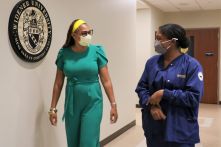Nursing Invests in Diversifying Classroom, Workplace with $1.6 Million Grant

A new federal grant awarded to the School of Nursing will support the program’s efforts to increase diversity among future generations of nursing professionals.
The funding, awarded by the Health Resources and Services Administration, provides $1,655,281 over four-years to implement Project PRIDE: Preparing Registered Nurses Through Inclusivity, Diversity, and Empowerment, which aims to increase diversity within Widener’s nursing student population.
“Workforce diversity is a priority within the nursing profession and this funding will enable us to contribute to that effort by seeking students from underrepresented populations and communities and providing them with the support they need to be successful,” said Anne Krouse, Dean of the Dwyer School of Nursing.
Using targeted recruitment efforts, Project PRIDE focuses on generating an interest in the nursing profession and improving access to higher education in local communities facing socio-economic determinants.
Along with support for college access processes such as applications, the program will help to alleviate students’ financial burdens through aid for tuition and fees, stipends to minimize the need to work, and funds for a computer and uniforms.
The program, which welcomed its first cohort of students this semester, reflects the university’s ongoing commitment to foster a more diverse, equitable, and inclusive campus community.
“The ultimate goal is to diversify the nursing workforce to be more reflective of what we look like as a nation today,” said Jawanza Bundy, assistant professor and student support director for Project PRIDE.
Bundy, who is Black, knows firsthand the transformative power of joining the nation’s largest health care profession.
“I look at nursing from a different perspective because I am a minority. I was a student, and nursing brought so many things to my life that wouldn’t have come if I didn’t have the opportunity to become a nurse,” Bundy said.
With steady job market growth and a demand for registered nurses, Bundy says that nursing “is a way for some students to improve themselves financially and increase their socio-economic standing. For some people, [nursing] may be a way out from some of the circumstances that they may be in right now.”
In addition to financing opportunities, the students will receive hands-on guidance through a robust mentoring system, led by Bundy and Rose Rossi, undergraduate associate dean and the program’s student services director. Resources like academic tutoring along with faculty and peer mentoring will give students the tools to manage and succeed in the fast-paced and high-demand learning environment.
Students will also be paired with student members of Chi Eta Phi Sorority, Incorporated, a national organization founded by Black female nurses that now represents many cultures and diverse ethnic backgrounds, to receive additional social and professional guidance.
“We partnered with Chi eta Phi so that our students will have additional role models who look like them and who will help to mentor them through their years in the program and navigate nursing,” said Bundy.
Ultimately, as Bundy explained, the program’s initiative, like most nursing efforts, is geared toward delivering the highest quality patient care and improving patient outcomes.
“I believe that all people deserve culturally competent care and I think that by diversifying the nursing workforce, we can help to reach that goal,” Bundy added.




